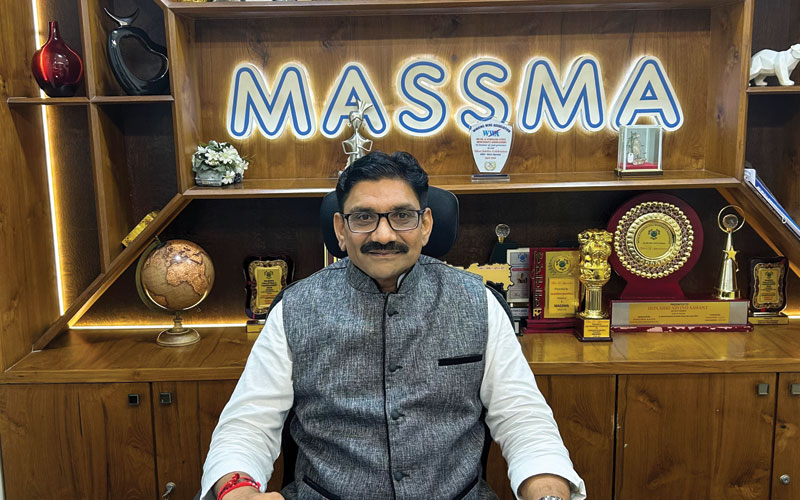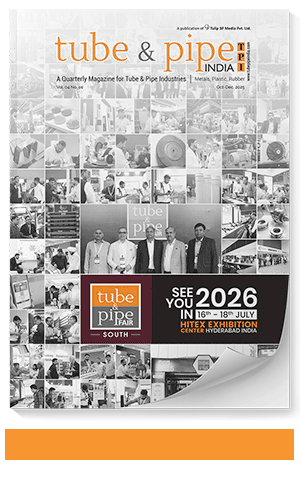Launched in 1982, Metal And Stainless Steel Merchant’s Association (MASSMA) is the leading industry body for the development of the stainless steel and metal trade. Its members are manufacturers, traders, importers, exporters, stockists and suppliers of metal products. Started with just 40 shops, the association has grown rapidly over the years to approximately 5,000 shops. “As an association, we aim to promote the growth of the industry collectively and help the newcomers to settle and grow”, Mr. Chandan Bhansali, President, MASSMA, informs Tube & Pipe India.

Tube & Pipe India: Please tell us about MASSMA, its history and its journey.
Chandan Bhansali: Established in 1982, MASSMA is the leading association for the development of the stainless steel and metal industry. Based in Mumbai, the association was established to serve the ferrous and non-ferrous industry as well as its merchants. The association’s members include manufacturers, traders, importers, exporters, stockists and suppliers of metal products. It has been 42 years since we started MASSMA, with just 40 shops. Today, it has grown to approximately 5,000 shops and there are 2,200 active members. Originally located on Kika Street in Gulalwadi, the metal market has expanded to Kumbharwada, Khetwadi, and Opera House. The businesses themselves have also been spreading their reach.
TPI: How does MASSMA support the business growth of its members?
CB: Recognizing the importance of metal trading globally, MASSMA strives to address the concerns of merchants and help the industry to succeed. We know the problems a businessman faces. We always encourage our members to meet, have open discussions about the challenges we are facing, and look forward to their support and suggestions so that we all can evolve together. As an association, we aim to promote the growth of the industry collectively and help the newcomers to settle and grow.
Most importantly, we listen to all concerns and suggestions, and take the representation to the relevant government department. The goal, overall, is to overcome the challenges faced by the business community.
TPI: Can you elucidate some successful initiatives undertaken by MASSMA?
CB: We connect merchants with relevant industries to foster growth and collaborations. We also try to build a mechanism to protect the merchants and at the same to address the workers’ grievances. For example, when GST was introduced, it created an atmosphere of fear within the industry. Every trader had a feeling that the GST would pose a threat to their business. We took the representation to the then Finance Minister, Government of Maharashtra, Mr. Sudhir Mungantiwar. We were able to persuade him to make amendments to the newly introduced law to protect the interest of our members. This also resulted in widespread acceptance of GST amongst the merchants and traders.
This is just one drawn from a long list. We also organize seminars, conferences, lectures and discussions in relation to ferrous and non-ferrous metal trading. Recently, we organized the MASSMA business summit, where we invited big industrialists to interact with them to gain more knowledge about the industry. The insights from the summit are incorporated into our educational programs, where we provide members with step-by-step guidance on growing the business. So, our focus is mostly to do seminars, to create awareness among the people.
As an association, we aim to promote the growth of the industry collectively and help the newcomers to settle and grow.
TPI: From trading to value addition and manufacturing, MASSMA members have evolved a lot. Please comment.
CB: Since 1982, the metal market has evolved rapidly. People started doing business on cycles, then moved to small shops and then grew further. As the competition increased in the metal industry, people started entering the manufacturing segment to have better control on the cost and improve the margins. Currently, over 25 percent of the members are in the manufacturing segment. The number has not risen in proportion with the market. I believe that finance is a significant issue to venture into manufacturing. Establishing a manufacturing unit requires a huge investment and space. I believe that the number will grow consistently day by day.
Also Read: Tube & Pipe Fair: Sets Foot in South
TPI: Please tell us about your views on the state of the industry. How has the trade evolved over a period of time?
CB: The metal industry offers vast opportunities. Traditionally, metal shops offered a wide range of metals like stainless steel, aluminum, copper, and brass. However, as the market has grown, specialization has increased. Today, you might find shops dedicated to brass items, copper items, or specific metals like aluminum, MS (mild steel), or stainless steel. Even in specific segments, for example, in stainless steel, the specialization has increased that we find pipes, tubes, rods, wires, and many more. In stainless steel pipes and tubes, we have seamless and welded. These categories further branch out into NB and OD sizes. This highlights that the growth potential is very high.
From the beginning and even today, my vision has remained constant – to empower fellow businessmen to achieve growth. Our core mission is to help others thrive. There are significant challenges and struggles in the world of trade. However, it is also an extremely fulfilling profession. Everyone should rise above obstacles and find opportunities for learning among them. Nothing good comes without a struggle.
TPI: What are your future plans? What are your expectations from the government?
CB: MASSMA is a one-stop shop for the metal industry, encompassing import, export, manufacturing, and trade. Our diverse services address challenges faced across the entire supply chain.
For importers, we understand the complexities of navigating regulations like BIS (Bureau of Indian Standards). When new regulations create hurdles, we analyze the impacts and advocate for reasonable policies that support both industry growth and quality standards.
For exporters, we identify and address export challenges to ensure a business runs smoothly.
For manufacturers, we empower the next generation of entrepreneurs by offering practical guidance on entering the manufacturing sector and navigating the export process. This includes hosting informative seminars and workshops.
As a sector contributing significantly to the economy through taxes (approximately INR 70,000 crore), we urge the government to be more supportive of our demands. By working together to address our challenges, we can achieve better economic growth for all.










